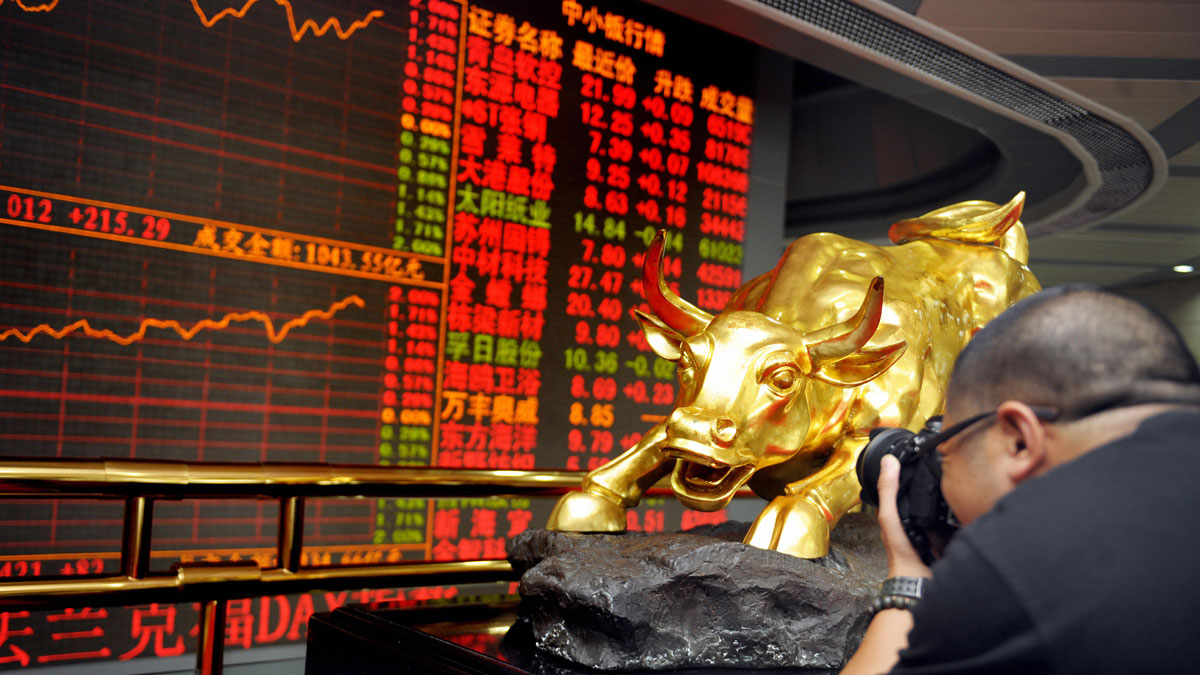China: Markets stall over fears for the economy
Share prices stay flat after survey suggests business activity weakened in April

A free daily email with the biggest news stories of the day – and the best features from TheWeek.com
You are now subscribed
Your newsletter sign-up was successful
Fresh fears about China's economic slowdown have prompted share prices to stall on the country's main markets.
The Shanghai Composite Index was up slightly at 2,995.41 in afternoon trading, after dipping by 0.3 per cent to 2,983.06 over the course of the morning. Hong Kong's Hang Seng dipped 0.1 per cent to 20,501.48, after falling 0.4 per cent earlier in the day.
Public holidays meant there was no trading in South Korea or Japan while in Australia, "bank shares outpaced the broader market", says the BBC.
The Week
Escape your echo chamber. Get the facts behind the news, plus analysis from multiple perspectives.

Sign up for The Week's Free Newsletters
From our morning news briefing to a weekly Good News Newsletter, get the best of The Week delivered directly to your inbox.
From our morning news briefing to a weekly Good News Newsletter, get the best of The Week delivered directly to your inbox.
Today's flat performance could mean China's "robust market rebound" since early March is losing momentum, warns Reuters, with mounting concern the recovery could be short-lived.
Fears of a continued slump received fresh impetus from a private survey that suggests business activity "softened slightly" in April, says the BBC.
Beijing took action to address its slowing growth earlier this year, but Reuters says there are "signs" that the fresh liquidity injected into the economy by the state has only boosted property and commodity prices instead of "energising China's economic muscles".
China economic expert Arthur R Kroeber told the New York Times that government intervention could be the problem, not the solution for China's economic woes. Successful companies need "space" to develop and not to be controlled, he said.
A free daily email with the biggest news stories of the day – and the best features from TheWeek.com
"When the stock market crashed, rather than allowing a bust - which you should, if you really want more market forces - the government opted to intervene, ordering state firms to buy shares to keep prices artificially high," he added.
"Now it's trapped, because the state firms that bought these shares can't sell them without triggering a panic sell-off."
Kroeber also pointed to an ideological clash between President Xi Jinping and more radical thinkers over the country's exchange rate, saying the central bank wanted a "flexible rate that will help it set monetary policy in the normal way".
The President and other "stability-oriented people" in China's ruling Communist Party, however, want to keep the rate stable because "if it's not stable, then people will think that China isn't stable and that will be bad".
Kroeber added that, under Xi, "the desire to control things has won out over the desire to reform and liberalise".
-
 Political cartoons for February 16
Political cartoons for February 16Cartoons Monday’s political cartoons include President's Day, a valentine from the Epstein files, and more
-
 Regent Hong Kong: a tranquil haven with a prime waterfront spot
Regent Hong Kong: a tranquil haven with a prime waterfront spotThe Week Recommends The trendy hotel recently underwent an extensive two-year revamp
-
 The problem with diagnosing profound autism
The problem with diagnosing profound autismThe Explainer Experts are reconsidering the idea of autism as a spectrum, which could impact diagnoses and policy making for the condition
-
 Labour shortages: the ‘most urgent problem’ facing the UK economy right now
Labour shortages: the ‘most urgent problem’ facing the UK economy right nowSpeed Read Britain is currently in the grip of an ‘employment crisis’
-
 Will the energy war hurt Europe more than Russia?
Will the energy war hurt Europe more than Russia?Speed Read European Commission proposes a total ban on Russian oil
-
 Will Elon Musk manage to take over Twitter?
Will Elon Musk manage to take over Twitter?Speed Read The world’s richest man has launched a hostile takeover bid worth $43bn
-
 Shoppers urged not to buy into dodgy Black Friday deals
Shoppers urged not to buy into dodgy Black Friday dealsSpeed Read Consumer watchdog says better prices can be had on most of the so-called bargain offers
-
 Ryanair: readying for departure from London
Ryanair: readying for departure from LondonSpeed Read Plans to delist Ryanair from the London Stock Exchange could spell ‘another blow’ to the ‘dwindling’ London market
-
 Out of fashion: Asos ‘curse’ has struck again
Out of fashion: Asos ‘curse’ has struck againSpeed Read Share price tumbles following the departure of CEO Nick Beighton
-
 Universal Music’s blockbuster listing: don’t stop me now…
Universal Music’s blockbuster listing: don’t stop me now…Speed Read Investors are betting heavily that the ‘boom in music streaming’, which has transformed Universal’s fortunes, ‘still has a long way to go’
-
 EasyJet/Wizz: battle for air supremacy
EasyJet/Wizz: battle for air supremacySpeed Read ‘Wizz’s cheeky takeover bid will have come as a blow to the corporate ego’